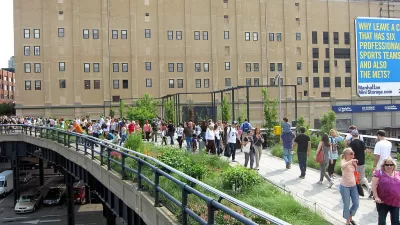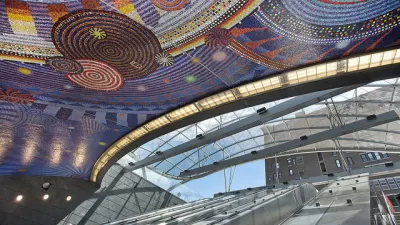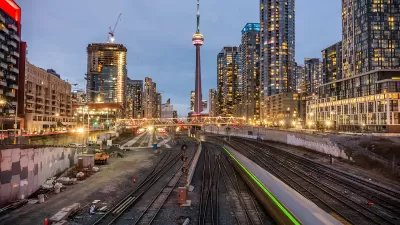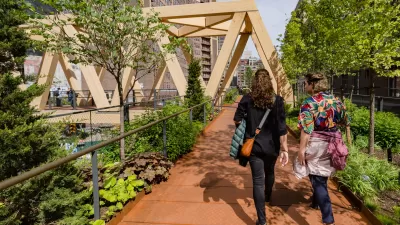The projects depicted here re-use and re-appropriate public space, filling gaps in the built environment with parks, open areas, and pedestrian walkways.

New York's High Line is only one example of the re-appropriation of heavy infrastructure and the spaces it leaves unfilled. This piece lists nine more projects: "What these types of retrofits mean for city dwellers: that any one of them has just as much a right to the use of their city's public space as do the large-scale, heavy-duty applications that previously had exclusive claim to it."
Ross Brady continues, "As for the designs of these new spaces, the evolution of this practice owes a lot to the theoretical emergence of landscape urbanism — that is, that a city should be defined by its open spaces and that its buildings should be understood as structures that simply occur around them." The projects reuse many kinds of spaces, and that reuse doesn't necessarily spell an end to original functions. Examples include:
- Queens Plaza Bicycle and Pedestrian Improvement Project; Long Island City, NY
- Times Square Reconstruction; New York City, NY
- Erie Street Plaza; Milwaukee, WI
- Seattle Art Museum: Olympic Sculpture Park; Seattle, WA
FULL STORY: Contested Landscapes: 9 Public Re-Appropriations of Urban Infrastructure

Planetizen Federal Action Tracker
A weekly monitor of how Trump’s orders and actions are impacting planners and planning in America.

Map: Where Senate Republicans Want to Sell Your Public Lands
For public land advocates, the Senate Republicans’ proposal to sell millions of acres of public land in the West is “the biggest fight of their careers.”

Restaurant Patios Were a Pandemic Win — Why Were They so Hard to Keep?
Social distancing requirements and changes in travel patterns prompted cities to pilot new uses for street and sidewalk space. Then it got complicated.

Platform Pilsner: Vancouver Transit Agency Releases... a Beer?
TransLink will receive a portion of every sale of the four-pack.

Toronto Weighs Cheaper Transit, Parking Hikes for Major Events
Special event rates would take effect during large festivals, sports games and concerts to ‘discourage driving, manage congestion and free up space for transit.”

Berlin to Consider Car-Free Zone Larger Than Manhattan
The area bound by the 22-mile Ringbahn would still allow 12 uses of a private automobile per year per person, and several other exemptions.
Urban Design for Planners 1: Software Tools
This six-course series explores essential urban design concepts using open source software and equips planners with the tools they need to participate fully in the urban design process.
Planning for Universal Design
Learn the tools for implementing Universal Design in planning regulations.
Heyer Gruel & Associates PA
JM Goldson LLC
Custer County Colorado
City of Camden Redevelopment Agency
City of Astoria
Transportation Research & Education Center (TREC) at Portland State University
Camden Redevelopment Agency
City of Claremont
Municipality of Princeton (NJ)





























